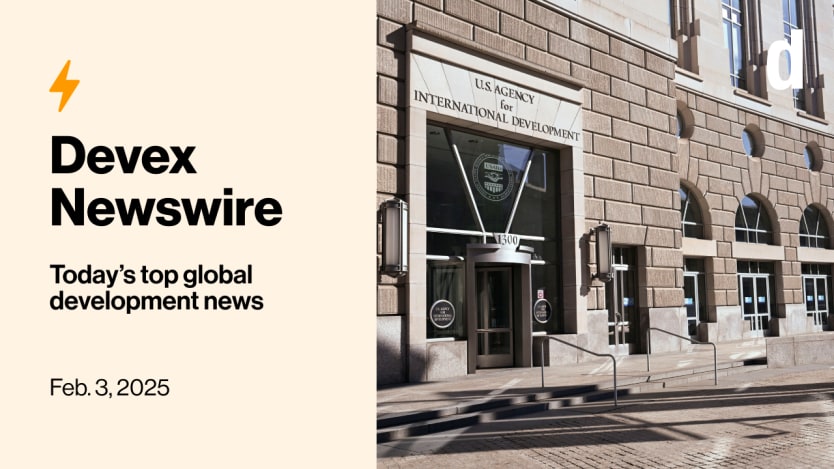Presented by Operation Smile

This newsletter could be dated shortly after you receive it. That’s because speculation is rampant that U.S. President Donald Trump will do what aid advocates had long dreaded: fold USAID into the U.S. State Department — hollowing out the agency’s influence. Some have said it would mark the end of America’s premier aid agency altogether.
As of publication, though, no official merger yet, but there have been a slew of other developments resulting from Trump’s U.S. foreign aid freeze, from a PEPFAR reprieve to a USAID-DOGE clash.
Office politics
USAID employees received an email — seen by my colleague Sara Jerving — that the agency’s headquarters will be closed today and anyone working must do it remotely. This only adds to rampant speculation that the department may be absorbed into the U.S. State Department.
This is a preview of Newswire
Sign up to this newsletter for an inside look at the biggest stories in global development, in your inbox daily.
In a sign of the dramatically escalating tensions between USAID staff members and Trump’s team, USAID’s director of security, John Voorhees, was placed on administrative leave after refusing to allow officials from the Department of Government Efficiency, or DOGE, access to the agency’s sensitive compartmented information facility, a secure area that protects classified information, my colleague Elissa Miolene scooped over the weekend.
Following Elissa’s reporting, Democrats on the Senate Foreign Relations Committee wrote a letter to U.S. Secretary of State Marco Rubio stating that “this incident as a whole raises deep concerns about the protection and safeguarding of matters related to U.S. national security.”
DOGE staff members do not have the security clearances to review such information and are not legally qualified to access classified or sensitive information. In recent days, there’s been an uptick of fear across USAID staff as DOGE has entered the building — both literally and virtually — with many staff moving to Signal to avoid being tracked by the budget-slashing agency run by billionaire Elon Musk.
On his social media platform X on Sunday, Musk retweeted a post about the incident, along with an ominous message: “USAID is a criminal organization. Time for it to die.” In an audio message on X, he said he and Trump were in agreement on “shutting [USAID] down,” and this morning he posted: “We spent the weekend feeding USAID into the wood chipper.”
USAID’s legislative and public affairs team — which maintains close contact with members of the U.S. Congress — was also dismantled. While exact numbers are unknown, 40 to 100 staff members were reportedly placed on administrative leave as of Sunday morning, according to those familiar with the matter.
They join more than a thousand other agency officials and contractors who’ve found themselves out of a job — and thousands more are expected to join their ranks as a result of the aid freeze.
Read:
• Scoop: USAID closes headquarters Monday amid Trump transition chaos
• Scoop: USAID director of security, legislative staff placed on leave
+ Join us today at 12 p.m. ET (6 p.m. CET) for a briefing on the latest insights into the U.S. aid crisis. Save your spot now! If you can’t attend live, register anyway and we’ll send you a recording.
This event is exclusively for Devex Pro members. Not a Pro member yet? We offer a 15-day free trial.
Die trying
A top USAID official who took a stand and tried to cancel the administrative leave orders slapped on 60 senior agency executives last week was himself placed on administrative leave for doing so.
“Attached, please find a memorandum documenting the cancellation of your administrative leave status under my authority,” USAID Director of Employee Relations Nicholas Gottlieb wrote in an email obtained by Devex. “Before you get your hopes up, your systems accesses remain severed; you may receive another email within the day reinstating your leave status. However, that notice will not come from me.”
About two hours later, after he was put on leave, he fired off a second email: “It is and has always been my office’s commitment to the workforce that we ensure all employees receive their due process in any of our actions. I will not be party to a violation of that commitment.”
Read: USAID official who fought ‘illegal’ purge is pushed out of agency
ICYMI: Senior USAID officials put on leave amid fallout from executive order
A small new pep in its step
We broke the story that many had been anxiously anticipating since the U.S. State Department issued a “life-saving humanitarian assistance” exemption that didn’t clarify whether the lifesaving U.S. President’s Emergency Plan for AIDS Relief, or PEPFAR, would be included.
On Saturday, my colleague Adva Saldinger scooped that two parts of PEPFAR had received a limited waiver and could resume operations: antiretroviral medications critical to keeping HIV/AIDS patients healthy and treatment to prevent mother-to-child transmission.
It was only a partial sigh of relief though. In a recurring pattern in this administration, the order can be open to interpretation.
“It is welcome news that this seems to be moving forward but the devil is in the details,” Jen Kates, senior vice president and director of the global health and HIV policy program at KFF, tells Adva. “Stopping existing work and making it hard to figure out what's being stopped and what exceptions are has created chaos. The chaos, whether it’s intentional or not, has effects on actual people’s lives and livelihoods and survival.”
Exclusive: Some PEPFAR programs get waiver to restart operations
Read: Confusion, fear as PEPFAR partners suspend HIV services
ICYMI: Stop-work could destroy US global health infrastructure, Atul Gawande says
Turning to the courts
A lawsuit is expected to be filed today in Washington, D.C., challenging the foreign aid freeze and stop-work order, Adva tells me.
The objective is to obtain a temporary restraining order followed by a permanent injunction in which the court tells the Trump administration to unfreeze funding, restart payments, and provide clarity about cost reimbursement, including idle labor time, says Robert Nichols, a partner at Nichols Liu, the law firm bringing the suit.
The lawsuit will be based on violations of the Administrative Procedures Act, which “requires the court set aside agency actions that are arbitrary, capricious and abuse discretion or are otherwise not in accordance with the law,” he tells Adva.
However, it has been hard to find a plaintiff or plaintiffs willing to sue, Nichols said during a conference call Friday. The solution for now is that a 501c3 that represents members harmed by the funding freeze will be the lead plaintiff, though Nichols is looking for others to join.
“We are crafting the legal arguments to not be incendiary. We have no interest in poking the administration in the eye and creating retribution,” Nichols said. “We want to make pure legal arguments to try to change the status quo of the freezing of funds and meet some more objectives, but we are not interested in taking this on as a political fight.”
Background reading: ‘I don’t think anyone can survive for 90 days’ — aid’s grim new reality
Fighting for WHO
Scores of Congressional representatives have written a letter to Trump asking that he “reevaluate” his order to withdraw the U.S. from the World Health Organization, arguing the U.S. “should not cede its title” as a global health leader. Their rationale: The move would endanger American jobs and American lives.
They’re not the only ones protesting. Lawrence Gostin, a renowned expert on global health law who teaches at Georgetown University, disagrees — and plans to challenge the withdrawal in court.
“I believe, and my legal team believes, that this is too monumental a decision to be left to the whim or even the grudge of a president and that it needs congressional approval. And that's the basis upon which we're considering legal challenges to Trump's actions,” he tells my colleague Jenny Lei Ravelo, calling the order “a mockery of … Congress” and a “gross violation of the law.”
Trump’s withdrawal order instructs officials to “identify credible and transparent United States and international partners to assume necessary activities previously undertaken by the WHO.”
That’s easier said than done because much of what WHO does cannot simply be replicated by other partners, Devex contributing reporter Andrew Green writes. That includes disease surveillance, especially outbreaks that could spread beyond borders, and setting global guidelines that protect U.S. consumers.
Read:
• Members of US Congress urge Trump to reconsider WHO withdrawal
• Trump's executive order on WHO, explained (Pro)
• Can the US replace the World Health Organization?
+ It’s time for our monthly quiz. Take our quiz and see how well you kept up with globaldev news in January.
In other news
Trump announces he is cutting all future funding to South Africa over its current land reform. [Politico]
The United Kingdom will unveil £100 million in seed funding to back businesses fighting poverty and climate change, marking a shift in its development aid strategy. [Financial Times]
Samoan Prime Minister Fiamē Naomi Mataʻafa calls Trump’s Paris Agreement withdrawal “very disappointing,” warning it threatens Pacific nations’ survival. [The Guardian]
Sign up to Newswire for an inside look at the biggest stories in global development.








